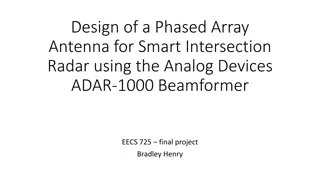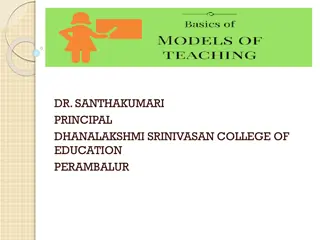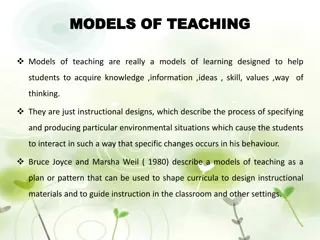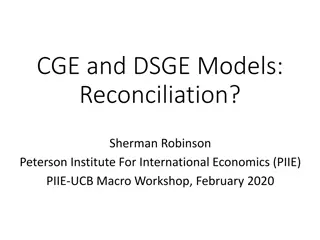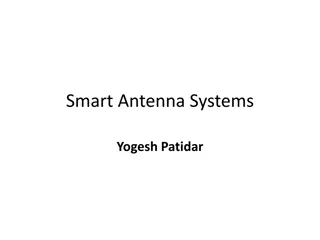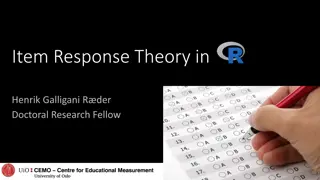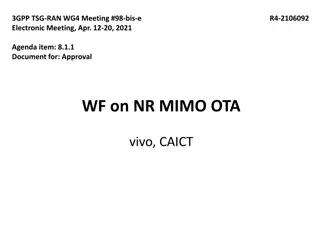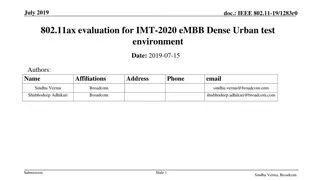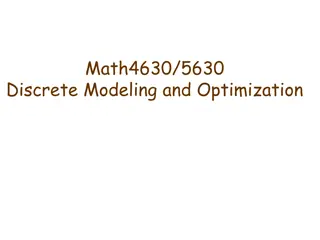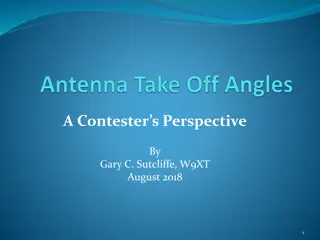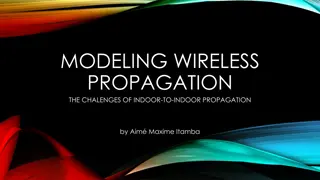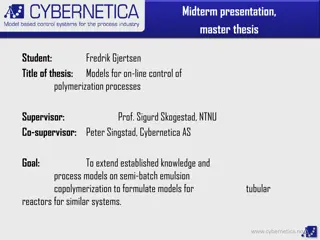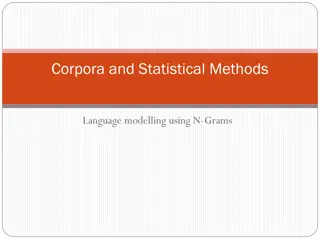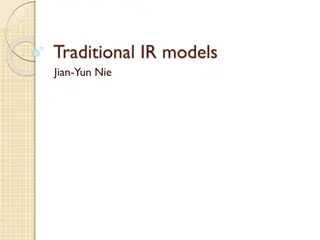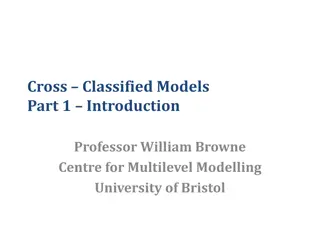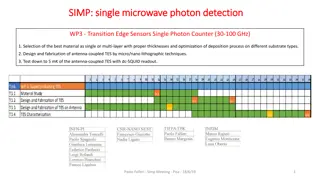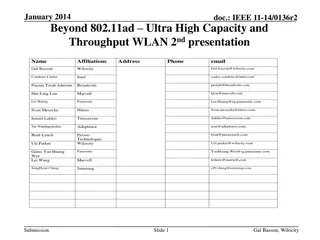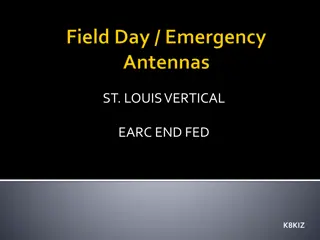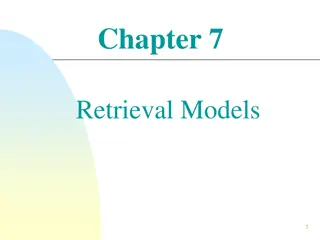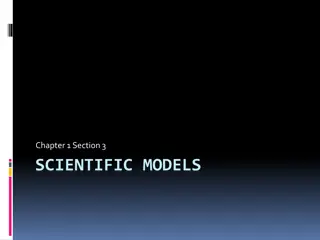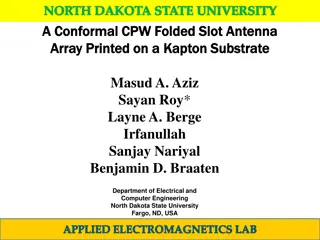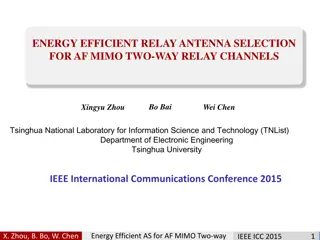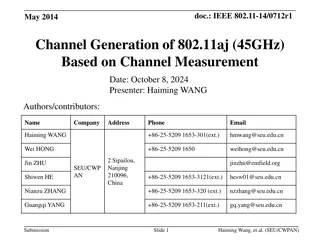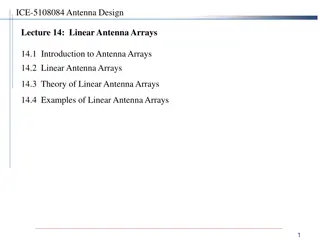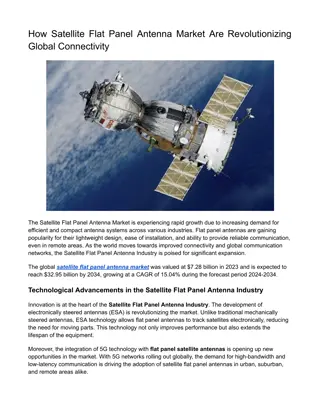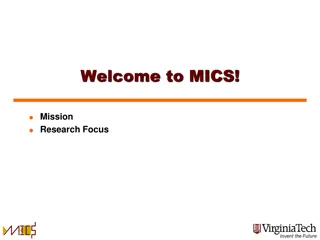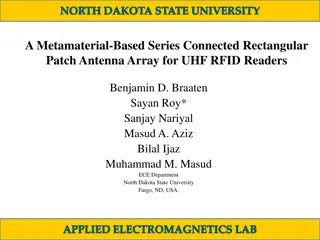Global Climate Models
Scientists simulate the climate system and project future scenarios by observing, measuring, and applying knowledge to computer models. These models represent Earth's surface and atmosphere using mathematical equations, which are converted to computer code. Supercomputers solve these equations to pr
3 views • 15 slides
System Models in Software Engineering: A Comprehensive Overview
System models play a crucial role in software engineering, aiding in understanding system functionality and communicating with customers. They include context models, behavioural models, data models, object models, and more, each offering unique perspectives on the system. Different types of system
3 views • 33 slides
Phased Array Antenna Design for Smart Intersection Radar Using Analog Devices ADAR-1000
Designing a phased array antenna system for a smart intersection radar project utilizing the Analog Devices ADAR-1000 beamformer. The system involves 4 independent phased arrays covering key directions in the intersection, with considerations for beam steering, beamwidth, and array configuration. Ke
0 views • 9 slides
Understanding Input-Output Models in Economics
Input-Output models, pioneered by Wassily Leontief, depict inter-industry relationships within an economy. These models analyze the dependencies between different sectors and have been utilized for studying agricultural production distribution, economic development planning, and impact analysis of i
8 views • 7 slides
Building a 40-Meter Turnstyle Antenna: Step-by-Step Guide
Learn how to construct a 40-meter turnstile antenna for improved signal coverage using detailed instructions, diagrams, and recommended coaxial cables. Discover the materials needed, calculate dipole lengths, set up the phasing line, and optimize performance for HF frequencies.
0 views • 17 slides
Understanding Models of Teaching in Education
Exploring different models of teaching, such as Carroll's model, Proctor's model, and others, that guide educational activities and environments. These models specify learning outcomes, environmental conditions, performance criteria, and more to shape effective teaching practices. Functions of teach
2 views • 20 slides
Understanding Models of Teaching for Effective Learning
Models of teaching serve as instructional designs to facilitate students in acquiring knowledge, skills, and values by creating specific learning environments. Bruce Joyce and Marsha Weil classified teaching models into four families: Information Processing Models, Personal Models, Social Interactio
1 views • 28 slides
Significance of Models in Agricultural Geography
Models play a crucial role in various disciplines, including agricultural geography, by offering a simplified and hypothetical representation of complex phenomena. When used correctly, models help in understanding reality and empirical investigations, but misuse can lead to dangerous outcomes. Longm
0 views • 8 slides
Understanding CGE and DSGE Models: A Comparative Analysis
Explore the similarities between Computable General Equilibrium (CGE) models and Dynamic Stochastic General Equilibrium (DSGE) models, their equilibrium concepts, and the use of descriptive equilibria in empirical modeling. Learn how CGE and DSGE models simulate the operation of commodity and factor
4 views • 15 slides
Smart Antenna Systems Overview: Enhancing Wireless Performance
Smart antenna systems, like adaptive array antennas and switched beam antennas, combine antenna arrays with digital signal processing to transmit and receive signals adaptively. These systems improve signal quality, reduce interference, and increase capacity by dynamically adjusting radiation patter
0 views • 20 slides
Enhancing Information Retrieval with Augmented Generation Models
Augmented generation models, such as REALM and RAG, integrate retrieval and generation tasks to improve information retrieval processes. These models leverage background knowledge and language models to enhance recall and candidate generation. REALM focuses on concatenation and retrieval operations,
1 views • 9 slides
Understanding Item Response Theory in Measurement Models
Item Response Theory (IRT) is a statistical measurement model used to describe the relationship between responses on a given item and the underlying trait being measured. It allows for indirectly measuring unobservable variables using indicators and provides advantages such as independent ability es
2 views • 32 slides
Approval and Validation Updates for NR MIMO OTA in 3GPP TSG-RAN.WG4 Meeting
The 3GPP TSG-RAN.WG4 Meeting discussed approval for the NR MIMO OTA workplan, addressed FR2 blocking issues, and emphasized the use of polarized antenna models. Updates were made to the power validation procedure and gNB beams usage criteria for FR1 MIMO OTA channel model validation. Collaboration w
1 views • 8 slides
Evolution of Structural Standards for Antenna Towers and Supporting Structures
The history of TIA-222 and its development through various industry groups led to the establishment of structural standards for steel antenna towers and supporting structures. Starting from TR-116 in 1949 to the latest ANSI/TIA-222-H in 2017, these published standards have evolved to ensure safety a
0 views • 19 slides
Evaluation of IEEE 802.11ax for IMT-2020 eMBB Dense Urban Test Environment
This document discusses the evaluation of IEEE 802.11ax technology in the context of the IMT-2020 Enhanced Mobile Broadband (eMBB) Dense Urban test environment. It analyzes the performance of 802.11ax in meeting the key PHY/MAC metrics required for eMBB Dense Urban scenarios, such as Peak Spectral E
2 views • 13 slides
Understanding Discrete Optimization in Mathematical Modeling
Discrete Optimization is a field of applied mathematics that uses techniques from combinatorics, graph theory, linear programming, and algorithms to solve optimization problems over discrete structures. This involves creating mathematical models, defining objective functions, decision variables, and
0 views • 12 slides
Exploring Legacy BASIC Programming for Antenna Applications
Retired technician "KV0OOM" aka Mike, seeking new hobby in Legacy BASIC programming with various dialects like GW-BASIC, for working on antenna applications like loading coils, yagi beam pattern design, and more. Learn conversion options, tokenized file handling, and tools of choice for Windows syst
0 views • 34 slides
Understanding Antenna Take-Off Angles for Improved Performance
Exploring the significance of antenna take-off angles in optimizing communication performance, this content dives into patterns, probabilities, and considerations for enhancing signal transmission across various regions. Insights are provided on antenna gain, beam patterns, and the impact of local t
1 views • 36 slides
Observational Constraints on Viable f(R) Gravity Models Analysis
Investigating f(R) gravity models by extending the Einstein-Hilbert action with an arbitrary function f(R). Conditions for viable models include positive gravitational constants, stable cosmological perturbations, asymptotic behavior towards the ΛCDM model, stability of late-time de Sitter point, a
1 views • 12 slides
Understanding Wireless Propagation Models: Challenges and Applications
Wireless propagation models play a crucial role in characterizing the wireless channel and understanding how signals are affected by environmental conditions. This article explores the different propagation mechanisms like reflection, diffraction, and scattering, along with the challenges and applic
1 views • 14 slides
Models for On-line Control of Polymerization Processes: A Thesis Presentation
This presentation delves into developing models for on-line control of polymerization processes, focusing on reactors for similar systems. The work aims to extend existing knowledge on semi-batch emulsion copolymerization models, with a goal of formulating models for tubular reactors. Strategies, ba
0 views • 16 slides
Understanding N-Gram Models in Language Modelling
N-gram models play a crucial role in language modelling by predicting the next word in a sequence based on the probability of previous words. This technology is used in various applications such as word prediction, speech recognition, and spelling correction. By analyzing history and probabilities,
0 views • 101 slides
Understanding Information Retrieval Models and Processes
Delve into the world of information retrieval models with a focus on traditional approaches, main processes like indexing and retrieval, cases of one-term and multi-term queries, and the evolution of IR models from boolean to probabilistic and vector space models. Explore the concept of IR models, r
0 views • 65 slides
Understanding Cross-Classified Models in Multilevel Modelling
Cross-classified models in multilevel modelling involve non-hierarchical data structures where entities are classified within multiple categories. These models extend traditional nested multilevel models by accounting for complex relationships among data levels. Professor William Browne from the Uni
0 views • 13 slides
Understanding General Equilibrium Models and Social Accounting Matrices
General Equilibrium Models (CGE) and Social Accounting Matrices (SAM) provide a comprehensive framework for analyzing economies and policies. This analysis delves into how CGE models help simulate various economic scenarios and their link to SAM, which serves as a key data input for the models. The
0 views • 50 slides
Research Project on Microwave Photon Detection with Transition Edge Sensors
Investigation and fabrication of TES materials for single photon detection in the microwave range, optimizing material selection, deposition processes, and antenna-coupled TES design. Tasks include materials characterization, antenna simulations, and TES microwave characterization. The project aims
0 views • 9 slides
Beyond 802.11ad: Ultra High Capacity and Throughput WLAN
The document from January 2014 discusses the exploration of modifications to IEEE 802.11ad-2012 PHY and MAC layers to enable modes of operation in the 60 GHz band capable of achieving a maximum throughput of at least 30 Gbps while maintaining the band's excellent capacity attributes. Topics include
0 views • 21 slides
Building the St. Louis Vertical Earc End-Fed Antenna - K8KIZ
The St. Louis Vertical Earc End-Fed antenna, designed by K8KIZ, has a strong reputation among ham radio enthusiasts. Originally utilizing Radio Shack twin-lead, modifications over the years have improved its design, making it easy to set up and operate. The antenna consists of a collapsible pole, PV
0 views • 24 slides
Understanding Retrieval Models in Information Retrieval
Retrieval models play a crucial role in defining the search process, with various assumptions and ranking algorithms. Relevance, a complex concept, is central to these models, though subject to disagreement. An overview of different retrieval models like Boolean, Vector Space, and Probabilistic Mode
0 views • 56 slides
Understanding Scientific Models and Their Applications
Explore the world of scientific models through this informative content covering physical, mathematical, and conceptual models. Discover why models are used in science, their types, and potential limitations. Delve into the importance of utilizing models to comprehend complex concepts effectively.
0 views • 21 slides
Conformal CPW Folded Slot Antenna Array on Kapton Substrate at North Dakota State University
The study conducted at North Dakota State University involves the design and analysis of a conformal CPW folded slot antenna array printed on a Kapton substrate. The research covers topics such as introduction, background, design guidelines, and measurement results. Various parameters of the antenna
0 views • 19 slides
Overview of Impedance and Reflection Coefficient in 1-Port Network Transmission Lines
Explore the fundamentals of 1-port networks, focusing on impedance, admittance, and reflection coefficient. This lecture from EEE 212 delves into the review of these key concepts essential for modern antenna design. Drawing insights from HP/Agilent Application Note 95-1, the discussion provides a fo
0 views • 140 slides
Understanding Composite Models in Building Complex Systems
Composite models are essential in representing complex entities by combining different types of models, such as resource allocation, transport, and assembly models. Gluing these models together allows for a comprehensive representation of systems like the milk industry, where raw materials are trans
0 views • 27 slides
Energy Efficient Relay Antenna Selection for AF MIMO Two-Way Relay Channels
The study explores energy-efficient relay antenna selection for AF MIMO two-way relay channels, aiming to optimize energy efficiency while maintaining performance. It discusses the advantages and disadvantages of two-way MIMO relay systems, emphasizing higher spectral efficiency, improved reliabilit
0 views • 17 slides
Channel Generation Process for IEEE 802.11aj (45GHz) Based on Channel Measurement
This presentation by Haiming Wang and team from SEU/CWPAN discusses the process of channel realization and generation in the 45 GHz bandwidth. It covers the generation of the channel impulse response, modeling of parameters, statistical measurements, and future work related to the 802.11ad standard.
0 views • 27 slides
Linear Antenna Arrays: Theory and Applications
Introduction to linear antenna arrays, including the concept of distributing radiating elements, combining array elements for specific beam characteristics, and the theory behind linear antenna arrays. Exploring the benefits of linear arrays in obtaining narrow beams, fan beams, and scanning capabil
0 views • 20 slides
How Satellite Flat Panel Antenna Market Are Revolutionizing Global Connectivity
The global satellite flat panel antenna market was valued at $7.28 billion in 2023 and is expected to reach $32.95 billion by 2034, growing at a CAGR of 15.04% during the forecast period 2024-2034.\n\nRead Report Overview: \/\/bisresearch.com\/indust
1 views • 3 slides
MICS Mission Research Focus
MICS focuses on conducting innovative research in integrated circuits, antenna/RF systems to advance knowledge and impact commercial, national security applications. It offers a high-quality educational experience for students to excel in academia and industry. Key guidelines include highlighting im
0 views • 6 slides
Overview of GSA Antenna Outleasing Program
Explore the legislative history, definition, and guidelines of the GSA Antenna Outleasing program, covering authorities applicable to antenna outleasing and negotiated terms for antenna site usage. Learn how federal agencies can facilitate access to rooftops for private sector carriers to enhance mo
0 views • 18 slides
Metamaterial-Based Series Connected Rectangular Patch Antenna Array for UHF RFID Readers
The metamaterial-based UHF RFID reader antenna array comprises features like rectangular patches, inter-digital capacitors, tuning stub, and a series fed array. The prototype dimensions and substrate details are provided along with resonant frequency observations. Test results include S-parameters o
0 views • 15 slides


